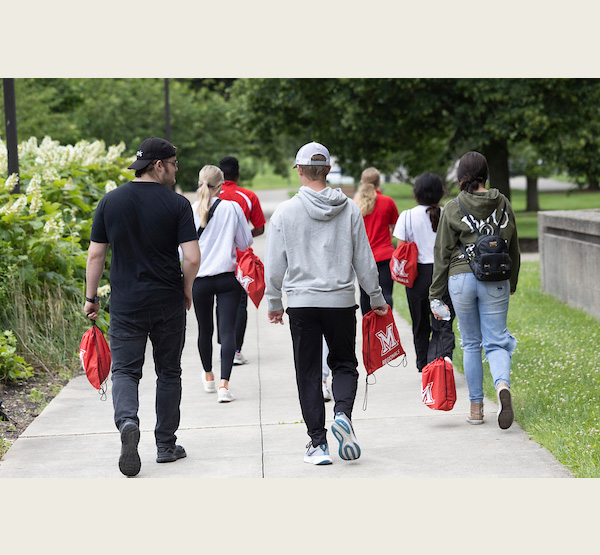Ten new things Miami University students will see in the 2024-2025 academic year
New dining concepts, a walk-in tech support center, and more
Ten new things Miami University students will see in the 2024-2025 academic year

1 — Reshaping Bachelor Hall as a hub of the humanities
Renovations are currently underway on Bachelor Hall, a two-year process that will consolidate space, modernize classrooms, and create an environment for scholarly work and interdepartmental collaboration.
Classes are planned to resume in fall 2026 in the building, which will house the departments of English; History; Media, Journalism, and Film; and Philosophy, as well as the Humanities Center, the American Culture and English Program, and the Ohio Writing Project.
Harris, Laws, and Upham halls will serve as temporary space until renovations are complete. The Department of Mathematics, previously in Bachelor, will now reside permanently in Upham.
This semester, Ogden Hall, a residence hall, has reopened for students.
2 — New walk-in tech support center replaces Café Lux
The new Tech Support Lounge now occupies the space where Café Lux was in the Armstrong Student Center. (For those seeking coffee, Starbucks is on the lower level of Shriver Center across the street.)
Although Miami will no longer be directly selling computers, IT Services has been engaged with all of the academic areas to establish a new program to ensure that Miami faculty, staff, and students have access to computer specs that indicate what machines are best suited for their degree programs or working needs.
3 — New dining concepts and allergen-friendly stations
Miami Dining Services has been working to enhance the dining experience on campus.
New stations featuring prepared foods without the top nine food allergens are located in Maplestreet and Western dining commons, as well as an à la carte option in Armstrong Student Center featuring build-your-own bowls. All allergen-friendly dining is called Delicious Without.
Armstrong also will offer a new concept: Ciao Bella, featuring a classic menu of Italian dishes crafted with traditional ingredients, as well as pizza and customizable pasta bowls and sides.
Bell Tower will have three new dining options, including Tower Grill, Pacific Rim, and Southwest Express, as well as a Starbucks. New at Garden Dining Commons: Planet Eats, featuring food that is plant-forward.
Maplestreet Dining Commons will feature the Social House that goes beyond great food and provides a space that sparks connections and conversations. More on what’s new at Miami Dining.

4 — King Library has new lounge, two sensory study rooms
Students who visit the library this semester will see some new changes. The Sidley Lounge space, replacing the former Center for Information Management, provides a modern new space with reservable study and meeting rooms as well as a comfortable place to hang out during the day.
Also new this semester are two reservable sensory study rooms. Designed to support the needs of the over 2,000 Miami students who have disclosed diagnosis and benefit from a sensory-friendly space, these rooms seat 1-4 users and are located in a quiet corner of the library. Students will be able to reserve them later this semester when construction is complete. More on study room reservations at Miami Libraries here.
5 — New First-Year Experience Lab, degree programs, and minors
At the College of Engineering and Computing (CEC), incoming first-year students now have access to the brand new First-Year Experience Lab. The 3,800-square-foot lab facility, completed over the summer, is designed to provide incoming students with intentional spaces for collaboration, communication, and community-building as they embark on their engineering and computing academic careers.
Engineering students seeking advanced degrees also have three new graduate program options to choose from. The new programs offer a Master of Engineering degree (M.Eng.) in either Biomedical Engineering, Chemical Engineering, or Mechanical and Smart Manufacturing Engineering. Each M.Eng. degree program is a one-year, full-time course of study with no thesis component, designed to offer workforce preparation, advanced skills, and a competitive edge in securing job opportunities to students not interested in pursuing thesis research.
New minors approved for this fall at Miami include Applied Social Science and International Studies.
6 — New Recreational Sports Center entrances, HawkFit
Over the summer, Miami updated the two main entrances to the Rec by replacing pavers and eliminating some pavement to make the hardscaped areas more useful. Tables and chairs will accompany fresh landscaping.
Coming in October, HawkFit — an integrated health and wellness program with a performance or logistics focus — will join programs and classes already offered to Rec members. “The goal of HawkFit is optimal energy, focus, and skill development to reach peak performance utilizing four primary areas of wellness: Mind, Body, Spirit, and Community,” said Mike Arnos, senior director of programs and academic partnerships at the Rec.
“We want to help people start wherever they are, work from their strengths, and help them achieve goals that are meaningful to them.” The program will run five weeks in groups of 15-20 at a cost of $40/person and include a 40-page resource and self-reflection guide.

7 — Miami Regionals builds new partnerships
As the Early College Academy enters its third year, Miami Regionals is pleased to welcome three new partner schools — Edgewood High School, Princeton High School, and the Greater Ohio Virtual School — further expanding an educational network that already includes Franklin, Hamilton, Madison, Middletown, New Miami, and Winton Woods. This collaboration enables students to complete high school while simultaneously earning a Miami associate degree at no cost. This fall, 169 students are registered, including 88 new and 81 returning students.
Thirty students from Hamilton admitted to Miami Regionals this fall will be the first to benefit from the Miami Hamilton Promise Scholarship, which covers tuition and fees in full for Pell-grant eligible students from Hamilton.
Additionally, Miami University, Butler Tech, and local businesses are working together to establish the Advanced Manufacturing Workforce and Innovation Hub in Hamilton. This state-of-the-art facility, set to open in January 2026, will serve as a center for advanced manufacturing training, offering students opportunities to earn diplomas, Microcredentials, certifications, and degrees.
8 — Art museum: New brand identity, fall exhibitions
The Richard and Carole Cocks Art Museum has a new brand identity, reflecting the museum's distinctive architectural design and commitment to artistic diversity. New fall exhibitions, from Aug. 27-Dec. 14, include:
• ARTificial Intelligence: A Student Response Exhibition (Douglass Gallery)
• Through Their Lens: Photographing Freedom Summer (Farmer Gallery)
• Collections Highlights: Recent Acquisitions (McKie Gallery)
Speaking of art, a significant new work by accomplished sculptor Leonardo Drew, “Number 381,” is the artist’s first bronze sculpture intended as permanent outdoor public art. The sculpture, dedicated in May, is located on the plaza between Hillcrest and Young halls on Western campus.
9 — Mental health initiatives
New initiatives include Welltrack Boost, a suite of online tools and courses that uses aspects of cognitive behavioral therapy to help students identify, understand, and address issues that you are having. Students can search for the app on the Apple store or Google Play and register with their Miami email to get set up.
The Student Counseling Service's "animal assisted therapy" officially starts this fall after a successful pilot program. Animal assisted therapy is a therapeutic intervention where a certified therapy dog is present during a counseling session.
A new Be Well MiamiOH website is now available through the office of Student Wellness. The site includes hundreds of wellness-related articles and short videos for college students.
10 — Drilling of geothermal wells continues
Miami broke ground this summer on the North Chiller Plant Geothermal Conversion project. The project will expand the underground geothermal exchange for heating and cooling buildings near north campus. By the project’s completion in 2026, 520 geothermal wells, 850 feet deep, in the south lawn of Millett Hall will eliminate more than 5,810 metric tons of carbon dioxide equivalents in emissions (MTCO2e) annually.
The university is committed to achieving carbon neutrality on its Oxford campus by 2040. This project is the next big step toward reducing carbon emissions. Thanks to the Utility Master Plan, Miami has already reduced energy-based carbon emissions by more than 51% since 2008.